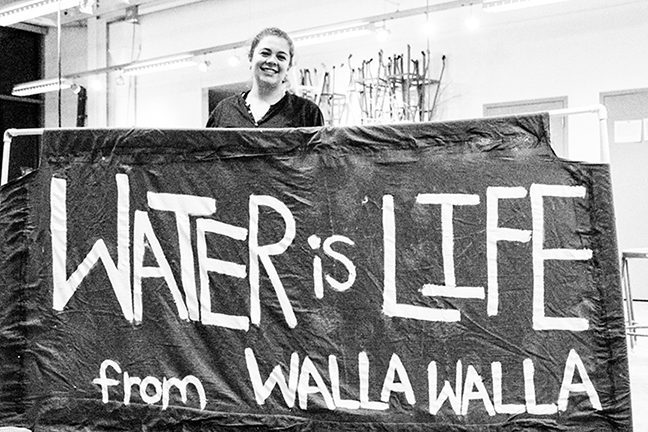#NoDAPL: Whitties Join the Activists
Whitman students travel to Standing Rock to stand with the tribes fighting against the Dakota Access Pipeline construction
Senior Maddie Bailey poses with a poster that Rapp, Law, Lee, Kitzerow and Woodall are bringing to the Standing Rock protest.
November 1, 2016
Groups of Whitman students are driving seventeen hours to North Dakota to support the Standing Rock Sioux Tribe’s protests against the Dakota Access Pipeline. As of November 1, one car of students had already departed, and other cars of students had plans to leave within the coming 1-2 days.
Protests began this past summer when the Army Corps of Engineers approved water crossing permits for the Dakota Access Pipeline, an oil pipeline designed to bring oil from North Dakota to Illinois. The pipeline will cross the Missouri River and lands sacred to the Standing Rock Sioux Tribe. Since this summer, over 140 activists have been arrested, and state troopers and the National Guard have tried to remove protest camps.
“I encourage everybody, especially Whitman students to go. I encourage people to talk to each other and get to North Dakota as fast as they can,” junior Kyla Rapp said. Rapp left the morning of November 1 to show her support at Standing Rock.
Rapp, juniors Katy Woodall and Julie Kitzerow, senior Mona Law and 2016 graduate John Lee are currently en route to the protest and plan to arrive on Tuesday, November 2. Though a few of them planned to attend the protest over winter break, they decided to go this week instead because the pipeline might be completed within the next two-to-three days.
“I think that now is a critical moment because I think that this thing is coming to a head right now,” Woodall said. “We decided that we needed to bite the bullet and go and take a week off of school because it could be too late if we wait until a break rolls around for us.”
The group noted that while any form of support is important, being physically present at the protests is the best way for individuals to have a part in actually stopping pipeline construction.
“Honestly, social media social activism is amazing, but if you see any kind of validity in this issue and you are in a position where you are not going to lose your job if you take a week off of school or work, then they need you right now,” Rapp said.
In addition to the fact that the pipeline construction would occur on sacred land, the pipeline could burst and contaminate the Missouri River. While this environmental hazard has gained attention in the media, Rapp wants students to remember that the Dakota Access Pipeline is not just an environmental issue.
“I think that at Whitman especially and in the larger public, people understand this issue through an environmental lens… Something I think we need to be focusing a lot more on to engage with the issue in thoughtful ways is to think of it as an indigenous sovereignty issue first,” Rapp said.
The entire group emphasized that they believe that students who care about the issue should go to the protests in North Dakota and physically display their support.
“I think what happened with the Dakota Access Pipeline matters to all of us,” Law said. “I think that being there, physically present, is really important.”
Editor’s note: This article was edited to more accurately refer to protestors as activists.







Eunice Blavascunas • Nov 4, 2016 at 1:59 pm
As an anthropology professor teaching about colonial struggles, the production of knowledge, and environmental issues, students will stand a much better chance of learning about these issues first hand by being in Standing Rock. I will work with students who have left for the protest to help them catch up with work when they return.
Katy Wills • Nov 2, 2016 at 12:17 am
I am beyond proud of these wise and proactive people. Your bravery in the face of danger is inspirational. Thank you.
Robyn Woodall • Nov 1, 2016 at 10:51 pm
As a parent of one of the Whitman protesters who is en route to Standing Rock, I have concerns for my daughter’s well being but am supportive of her commitment to be a visible part of the resistance to the breaching of tribal and environmental rights in North Dakota.